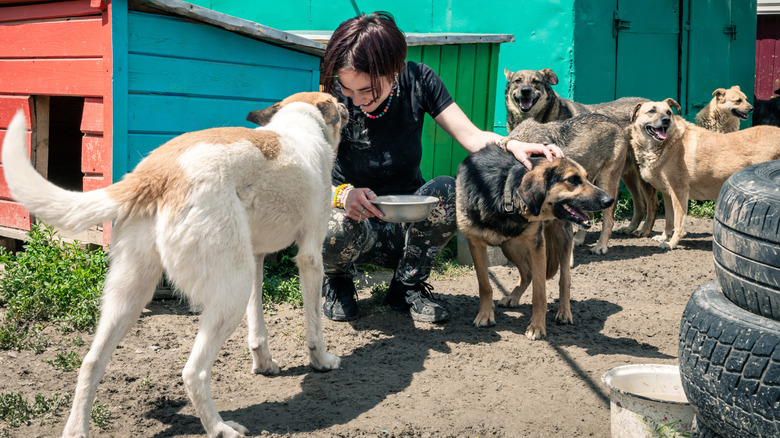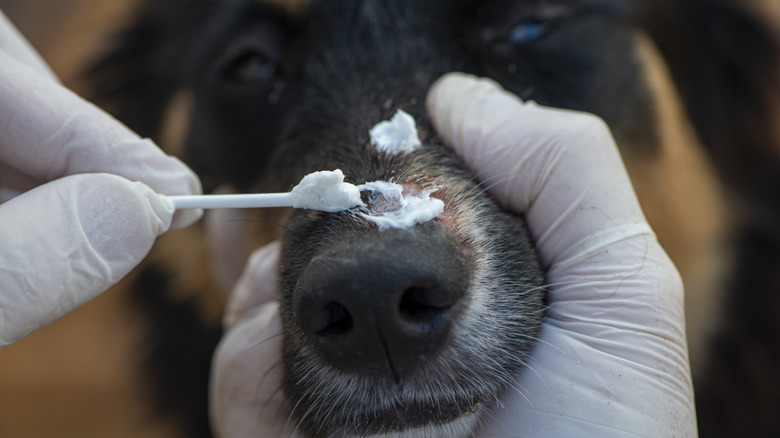If You Adopt A Shelter Dog, Check It For These Illnesses ASAP
When considering getting a dog, potential pet parents face many options. For some, the major question becomes whether to get a dog from a reputable breeder or welcome a shelter dog into their hearts. For the latter, giving a dog in need a forever home can be a deeply rewarding experience, but it also comes with unique challenges. Notably, certain illnesses are more prevalent in a shelter environment and there may be a few extra steps needed before you can fully welcome your new pup into its new home.
While shelters employ preventive medicine and knowledgeable staff to help stop the spread of diseases, the arrival of new dogs and various avenues of transmission make it impossible to identify every potential problem. Checking for health issues in a new pet is essential, regardless of the method of adoption. However, when adopting a shelter dog, there are specific illnesses a pet parent needs to check for immediately to help ensure the new family member's health and happiness, while avoiding unnecessary costs and stress.
Fleas and other pests may still appear even after treatment at a shelter
Whether it is fleas, ticks, or mites, pests can spread between different pets and their owners, making it a challenge to treat. The appearance of fleas on a dog can lead to discomfort from bites until the issue is treated. In addition, fleas can also transmit more serious diseases, which should make them a higher priority for treatment. This can include flea allergy dermatitis, which can cause extreme skin irritation and, in some cases, infections. Fleas can also spread Bartonella infections (commonly known as cat scratch fever), which is often asymptomatic but may cause fever, pain, and vomiting in some pets.
Ticks can also become an issue. Until you get preventive tick medicine from a veterinarian, the chances always remain for the dreaded bug to latch onto a pet. Ticks can carry various diseases, including Lyme disease, which can be fatal if left untreated, and Rocky Mountain spotted fever, which can cause severe joint problems in dogs. Alternatively, an infection with mites can lead to severe irritation, mange, and ear infections if left untreated. It is best to have a rescue dog examined for any pests, particularly in a multi-pet household.
Dogs from shelters have a higher chance of housing internal parasites
While living crawlies on the outside of a pet are visually disconcerting, owners also need to be aware of the potential for intestinal worms in a rescue dog. In shelters, the chances of a canine contracting intestinal worms are higher than in any other environment, due to the potential for contamination and spread when housing multiple animals. These can include roundworms, hookworms, whipworms, tapeworms, coccidia, and heartworms, which can spread from dog to dog through ingestion of feces, by pests, or passed down from dog parents to puppies.
Each of these internal parasites can affect dogs differently and can be more severe at various life stages. If adopting a puppy, a roundworm infection can result in stunted growth, among other issues. In severe cases, internal parasites can do permanent damage or be fatal. The majority of rescue animals arrive with at least one form of parasite. While shelters treat any incoming pets, the higher risk factor should prompt pet parents to get their pets checked for internal parasites early. As gross as internal parasites are, they are almost always easily treatable for pets under the guidance of a veterinarian.
Ringworm is a highly infectious skin condition that is hard to combat
Despite its name, ringworm does not belong to the internal parasites or external pests previously mentioned. Rather, ringworm is a fungal infection. While ringworm is most common in cats, in a shelter setting, it can spread from animal to animal, with some carriers showing no symptoms, and can be transmitted through hard-to-clean surfaces like blankets. In a shelter environment, the presence of ringworm can be challenging to detect and prevent.
The symptoms of ringworm are characterized by irritation and discomfort in a circular skin pattern that discolors the skin; anyone who has ever had athlete's foot will have an idea of what a pet is experiencing as it is a similar fungal infection. However, it is the annoyance that comes with the treatment of ringworm in dogs that makes it essential to check for it immediately. Treatment includes quarantining an infected pet, decontaminating the space, applying ointment, potentially giving oral medication, and multiple follow-up visits with a veterinarian. Treating ringworm is an expensive and time-consuming endeavor, and the cost can be multiplied if it spreads to other pets or people during the treatment process.
While not deadly, a breakout of ringworm at a shelter can be catastrophic and lead to forced euthanasia. For this reason, shelters implement numerous checks and utilize various tools to treat and prevent the spread of ringworm. Still, new owners should consult a veterinarian immediately if they suspect the presence of ringworm.
Kennel cough is one of the most persistent health issues shelters face
Canine infectious respiratory disease complex, commonly referred to as kennel cough, is a highly contagious respiratory infection that can quickly spread in places with numerous dogs, such as shelters, kennels, or daycares. This rapid transmission occurs through the cough and sneeze droplets of an infected dog, which can be inhaled or contracted through contact with surfaces. Additionally, a dog can be contagious even before displaying symptoms that would alert a caretaker or a shelter worker to the fact that the dog has contracted the disease.
Kennel cough can be easily identified, often accompanied by a distinctive cough that sounds like a honk, along with watery eyes, a runny nose, sneezing, and a loss of energy and appetite. The condition often resolves on its own with time, but dogs with compromised immune systems may require medication or oxygen administration. Every day a dog stays in a shelter, its chances of contracting kennel cough increase, and the illness remains one of the most prevalent health issues in animal care facilities.
Kennel cough is highly contagious, and certain dogs are more susceptible to severe symptoms, such as puppies or those that are unvaccinated. As such, owners should do their due diligence to address their dogs' medical needs and stop the spread of kennel cough when it occurs through proper veterinary care.
Dogs coming from shelters can have issues with anxiety
People are defined through their life experiences, and challenges in the past can manifest themselves as adults. This is also true for our furry friends, and, sadly, not all get to have that experience from being a little puppy straight to a loving family; some live a troubled life before making their way to a shelter. Notably, anxiety can occur within an unfamiliar environment and from a fear of being abandoned or left alone when coming from a shelter environment.
The symptoms of anxiety can manifest in various ways, including destructive behavior, barking, excessive drooling, aggression, urinating or defecating inside, and restlessness. For a new owner, this behavior can be a lot to accept. However, being patient with your new friend as it adapts, seeking to reduce anxiety, or reaching out to a certified trainer can all be essential steps in curbing anxious behavior. Since underlying health issues may also cause anxiety, it is crucial to discuss any concerns with your vet.
While it may seem like a long list of potential concerns for a future owner, adopting a dog from a shelter can be a rewarding experience. It is also important to note that any pet can face health issues; these conditions are not exclusive to rescue dogs. When it comes to shelters, being aware of the hard work and challenges the staff and animals encounter, as well as the fact that it is impossible to stop the spread of all illnesses, potential health concerns should be a minor consideration when planning a long life with your new furry friend.
Always consult your veterinarian before making changes to your pet's diet, exercise, or care. To find an accredited veterinarian in your area, you can search the American Animal Hospital Association's online database.





